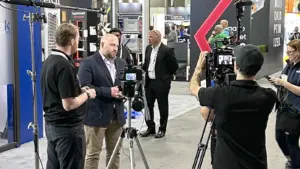BASELAYER EDGE X2 Shaping Your Next Sports Arena Experience
When most people think of sports arenas and stadiums, they picture the defensive line in a football game or a puck flying through the air inside a hockey rink. They’re not thinking all that much about the speed of the Wi-Fi network or the computing power behind the jumbotron display—until they try to upload a picture to Instagram and aren’t able to. The sheer number of people present at a sporting event means data computing loads are massive, and performance is critical.
A Lot of Data…In Short Bursts
When stadium and arena owners/operators must decide on which data center to implement that will best handle all that data, they realize the solution will need to be capable of doing a lot of work in concise bursts. At sporting facilities, data centers will typically only be busy for four to eight hours out of each week, making it impractical for these locations to build and operate data centers with enormous capacity. Mainly because doing so is exceedingly expensive.
That’s where the BASELAYER EDGE X2 module comes in.
“We’ve done quite a few modular designs for arenas, for example, at one of the larger ones that’s going to be popping up here [in Arizona] soon,” explains Marvin Rowell, Sr. DC Engineer at BASELAYER. “If you think about all the people inside a football stadium, almost all of the 80,000 people have a smart phone, a majority have multiple internet capable devices.”
Modular EDGE X2s from BASELAYER Provides Capability When Stadiums Need It
At any given time, these fans are engaging their phones to view a replay that they missed on the big screen, watching another game that’s on at the same time, purchasing merchandise, Snap-chatting with a friend, or checking Facebook, texts, or emails. To provide the Wi-Fi service to meet this kind of fan demand, arenas are adopting modular deployments such as the Edge X2s from BASELAYER. These cutting-edge modular data centers provide scalable capacity on demand. It also helps with complexity and cost as the basic infrastructure of power, cooling, network, monitoring and control is all contained within the module itself. Instead of working with n number of vendors to setup, a single technology partner such as Baselayer can deliver the whole solution, making it much easier and cost effective.
Better Customer Experience
Not just the stadiums, but other service providers such as broadcasters, social media are competing to provide better customer service. By deploying a modular Edge X2 unit at the site of such an event and fanfare gathering, these providers get better edge computing close to the content source/consumer.
“Some facilities might only need one, others need multiple units.” says Rowell. “It really all depends, but you can even take it down to the level of where the stadium is leasing these data centers to others; for example, like a marketing company.”
More Data, More Possibilities
“Marketing companies are using things like facial recognition and other types of technology to where, when you’re sitting in a game, they’re scanning the crowd. Through facial recognition, the technology can see, ‘There’s Suzy sitting in the stadium watching the football game, and she doesn’t have a team hat on.’ On Facebook, we should show her a team hat.’”
With this growth in effective marketing that relies solely upon data, more and more computing power is becoming increasingly necessary. By having modular data centers like the BASELAYER EDGE X2 set up around sports facilities, the stadium and land owners can boost bottom lines by leasing data space for specialized applications.
Learn more about the BASELAYER Edge X2 modular data center today by watching youtube.com/watch?v=HTJWWjVrfNw.
Read more at baselayer.com








